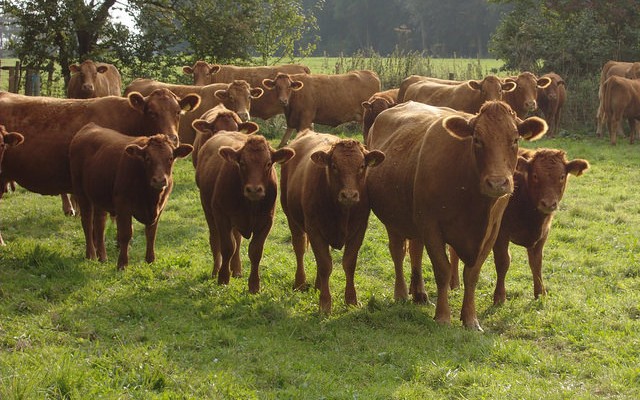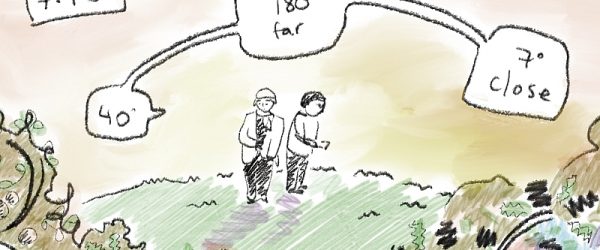In a much-viewed article published on the Guardian last week, Damian Carrington reported on a new study written up in the journal Science that suggests that refraining from meat and dairy products is the single most effective way of reducing our environmental impact. Consolidating data covering 38,700 farms and 1,600 processors, packaging types, and retailers, it’s purportedly the largest analysis of its kind ever undertaken.
Carrington’s article has attracted a vast number of comments (3,749 at last count). Many reveal their author’s sensitivity to the implications of the study, and hence the article: that eating animal products is unconscionable on environmental grounds, its impacts outstripping those of flying or driving a petrol-run car. The tone and direction of online comment threads is usually irreversibly set by the first commenter, in this case one Quaestor, who wrote: ‘There are a number of issues here, one of which is people’s natural reluctance – or indeed, refusal – to be told what to do. Speaking personally, I find self-righteousness unappealing to the point of outright rejection. The problem is, that the self-righteous are, on occasion, right.’
Even for an online comment, Quaestor’s presents us with a strange and misleading non sequitur. There is nothing remotely self-righteous about Carrington’s article. He is the Guardian’s environment editor, not an opinion columnist, and reports on the study in as even-handed a way as you could wish. At no point do the study’s authors, liberally quoted by Carrington, come across as pious. On the contrary, they speak measuredly about their findings, and, where they have changed their behaviour (one stopped consuming animal products during the research period) their tendency is to describe and explain rather than proselytise. So what is Quaestor, and many of the commenters who followed their lead, objecting to?
A clue can be found in the idea of ‘moralisation’, defined in a 1997 study by Paul Rozin, Maureen Markwith and Caryn Stoess as:
a rather common process … in which objects or activities that were previously morally neutral acquire a moral component. Moralization converts preferences into values, and in doing so influences cross-generational transmission (because values are passed more effectively in families than are preferences), increases the likelihood of internalization, invokes greater emotional response, and mobilizes the support of governmental and other cultural institutions.
According to Rozin, Markwith and Stoess, preferences and values shape our beliefs and behavior but values (and their violations) do so especially potently, leading to strong moral emotions like anger, contempt, disgust, guilt, and shame (hence the emotiveness of the comments on that Guardian article). Internalised, these values become central to the self in a way that preferences don’t.
Cigarette smoking is a good example. Once considered a morally neutral personal preference, it is now widely disapproved of due to the harm it causes to smokers, other people and the environment. Rozin, Markwith and Stoess describe this movement as a ‘hedonic shift’ whereby an object or activity (in our case, meat and its consumption) ‘changes from a liked to a disliked or even disgusting entity’.
Interestingly, however, the transformation of smoking from a preference into a value was not mirrored by a society-wide shift in attitudes towards the consumption of animal products even though the negative effects of both were first being brought to the public’s attention at around the same time during the 1970s. (In the United States today only 0.5 per cent of the population is vegan whereas around 75 per cent are non-smokers.) In fact, meat and dairy consumption is increasing, particularly in the developing world; by some estimates, by 2050 we will produce nearly twice as much meat as we do today.
Why did the moralisation of cigarettes succeed and that of meat stall? Rozin, Markwith and Stoess suggest that the difference may lie in the number of people who have come to view smoking as ‘both hedonically negative and disgusting’.
But I think the explanation is more complicated.
For one, the act of eating is culturally significant in a way that smoking is not. Central to our lives, both our consumption of and abstention from food has been throughout history a key vehicle for bonding among families, religions, and societies, often used to mark significant occasions.
There is also, I think, the sense that because we must eat to survive, the consumption of meat cannot be likened to inessential activities such as the various blood sports, which we largely condemn and refuse to take part in. Really, though, they are no more redundant than carnivorism – we need to eat, but we do not need to eat meat.
To continue to eat meat depends not on our biology but on our commitment to an idea that, if pushed, most of us would reject: that the spoliation of the natural world and the suffering of animals are less important than the gustatory pleasure we take in eating meat and dairy.
It is certainly not for want of reason that animal products continue to be widely regarded by individuals and institutions alike as morally acceptable (at least in moderation). The case against meat and dairy is, if anything, stronger than that against cigarettes, and getting stronger all the time as the full extent of animal suffering, environmental degradation, and cost to human health is exposed. Even on the grounds that smoking carries a special charge of immorality because it harms other people, the consumption of meat and dairy in fact measures up. As the philosopher Mylan Engel Jr points out in The Immorality of Eating Meat:
By not eating (or serving) meat we greatly reduce our chance of suffering a litany of debilitating diseases, we greatly reduce our children’s risk of suffering from these same diseases, and we, at least indirectly, help to reduce world hunger by reducing the demand for grain-fed meat, freeing up grain for humans. Thus, even if you were a speciesist who … only cared about human suffering, consistency with your other beliefs would still require you to stop eating meat.
According to Engel, the moral beliefs that may be necessary to prompt us to shift to a vegan diet – such as the idea that a world with less pain and suffering is preferable to a world with more pain and suffering, and that we ought to do what we reasonably can to avoid making the world a worse place – are already shared by most of us. Any moral (or even just what Engel calls a ‘minimally decent’) person would most likely take steps to prevent an act of animal cruelty happening on their street of the kind that goes on every day, at an almost incalculably greater scale, in the slaughterhouses that provide our meat. But contributing to ending the horrors of industrial animal farming does not require any such intervention – it merely requires us to refrain from consuming meat and dairy products.
It is this kind of cognitive dissonance that psychologist Jonathan Haidt characterises as a position of being ‘morally opposed but not behaviourally opposed’ to factory farming. ‘I love the taste of meat,’ Haidt wrote in The Happiness Principle, ‘and the only thing that changed after reading [Peter] Singer is that I thought about my hypocrisy each time I ordered a hamburger.’
I suspect we’ll have to wait a long time before meat and dairy products attract the same institutional opprobrium as cigarettes and are regulated and taxed accordingly, if not outright banned. In the meantime, how can individuals like Haidt make the shift from moral to behavioural opposition? For some, the plain facts will suffice. For others such as myself – I became a vegetarian around ten years ago – a negative epiphany may be required (in my case, a visceral response to what I took to be an act of animal cruelty by Bear Grylls on one of his TV shows).
Having stopped eating meat, the Science study has now persuaded me that my consumption of dairy products is no longer defensible either. I don’t feel self-righteous. I feel nervous; worried about how my decision will be received by others, and about my ability to sustain a dairy-free diet in the face of indiscipline and a world in which animal products are ubiquitous, coded as normal and inevitable.
To tell the truth, I also feel a little sad. Food gives me great pleasure, and connects me to my friends and family in important ways. Many of my most cherished childhood memories are inseparable from food, much of it meat- and dairy-based. But I also feel morally consistent in a way I haven’t before. If this is affronting, I think it is worth asking yourself why.
Image: Simon Huggins / flickr






